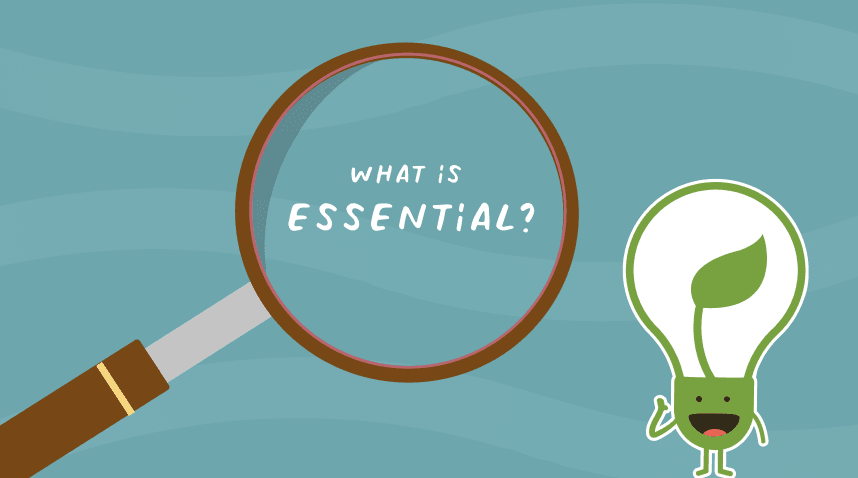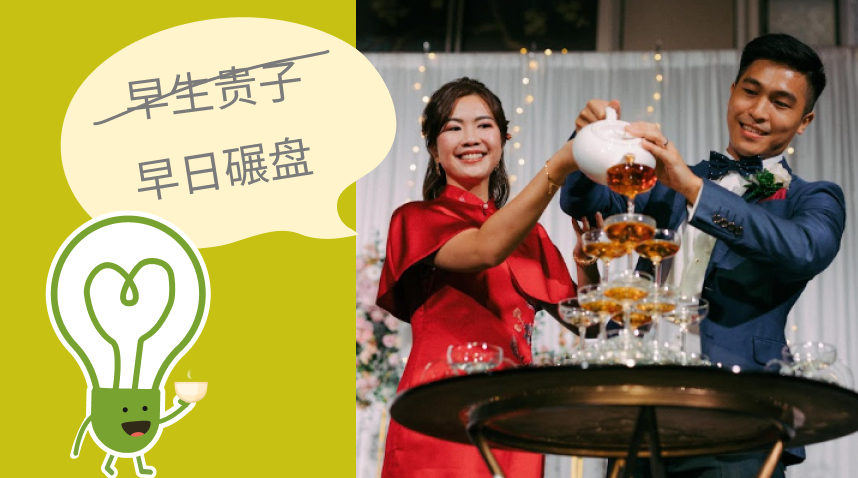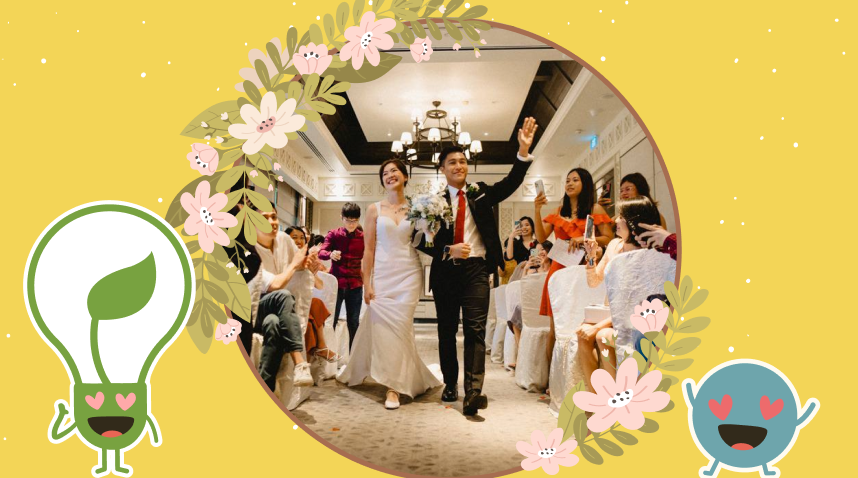TLDR: How can one plan a ‘Buddhist’ wedding in Singapore / Malaysia? Angela shares on how she approached her wedding planning while balancing cultural/societal expectations. Here are 8 tips for a smooth planning process
Planning a wedding can be overwhelming. Planning a Buddhist wedding can be even more daunting. After all, Buddha has never explicitly taught how to plan a wedding. Where do we begin? How much is too much?
After ticking off the bigger tasks like venue, guests list and objectives of the celebration, my partner and I started to brainstorm on Buddhist elements for our wedding. Initially, we wanted to include a Dhamma talk by a renowned Dhamma speaker and a guided meditation session.
We were apprehensive. Apprehensive because we were concerned that our guests from other religions may not be comfortable.
In addition, we were faced with limited time on our wedding programme flow. In the end, we decided to explore more covert ways of creating a Buddhist wedding.
Through relating to the Buddha’s core teachings, we incorporated values of gratitude, giving and the recollection of the triple gems into our wedding. We have put together 8 tried and tested tips that will help you make your wedding more Dhamma-centric.
1. Incorporate giving back to society in your wedding programme

Credits: Lovemetender films
Giving is one of those gifts that keep giving. You can embody the quality of giving in different ways.
For example, purchasing your door gifts from a social enterprise or setting aside some of your wedding hong bao for donation to the charity of your choice.
For our wedding solemnisation, my partner and I purchased honey jars from HoneySpree in support of underprivileged stay-at-home mums to empower them with financial independence. We also donated to Buddhist organisations and a hospice. Sharing that with our guests during the wedding made many smiles as we ended the celebration. When you spread the joy of your wedding celebrations through giving, more can benefit beyond your guest list.
2. Remove the non-essentials

Letting go is even more important than adding on. Identify what are your top 3 priorities and what are the 3 non-essentials in your wedding. For our wedding, my partner and I removed the cake-cutting ceremony as we could not resonate with the symbolic act of cutting a fake cake (non-essential).
We channelled the time saved to meeting and chatting with our guests (priority).
Identifying what are your priorities and non-essentials will help you focus your effort and money on what matters the most to both of you on your big day. For us, it was being present with our guests instead of rushing from table to table.
If you or your partner feels strongly against one or more of your non-essential, have an open chat and come to a consensus before you continue your planning. For us having a wedding planner, Pei Weddings, was helpful in mediating and helping us find common ground when we could not do it ourselves.
Our wedding planner, Pei Yi, helped remind us not to get carried away by the non-essentials and instead refocus on what is important. Asking for help is not a sign of weakness!
3. Replace champagne pouring with non-alcoholic option

Credits: Lovemetender films
Learning to say no is a sign of wisdom and maturity. In a typical Chinese wedding banquet, drinking alcohol and champagne pouring traditionally represent laughter and happiness.
As practising Buddhists who keep our 5 precepts, one of these training principles is to abstain from drinking alcohol. The intent of this precept is to retain our mindfulness and avoid wrong speech and unwholesome actions that could result from consuming alcohol. Thus, protecting oneself from regret and remorse.
My partner and I requested to replace the bottle of complementary champagne with a pot of tea. Funnily, as I typed this, I recalled how the hotel manager double then triple-confirmed with us as this is her first time receiving this request.
We firmly proceeded to replace the alcohol with tea. The outcome was well received. Many of our guests found this segment on 以茶代酒 very intentional yet not imposing our values on them.
4. Carve out time to give a Gratitude Speech

A thank-you speech is meaningful when it is personalised and well thought through. Use the speech to express your gratitude to your family and friends who meant a lot to you.
If you are like me, who is worried about tearing up while giving my speech (and ruining the bridal makeup), you may want to consider recording your speech and screening the video on the actual day.
It will take a lot more time and effort to film and edit the video, but it ensures you cover all grounds in terms of listing everyone you are grateful for.
5. Recite a sutta that resonates with you
Suttas are the teachings of the Buddha and reciting sutta at a wedding gives your guests and yourself an opportunity to reflect on the Buddha’s teachings (bonus benefit: reciting sutta helps to calm you down!).
We recited our favourite sutta Khp 5: Mangala Sutta (we engraved that sutta on our wedding rings too!). We were fortunate as Venerable You Guang, our esteemed wedding guest, not only made time for our wedding but initiated to lead the recitation of the sutta.
Venerable You Guang went the extra mile to explain what the sutta means. I remembered feeling extremely joyous after the recitation. If reciting sutta feels too much for you, you may want to consider extracting quotes (try the Dhammapada!) from your favourite sutta and weaving the quotes into your speech or decorations.

Credits: Lovemetender films
6. Invite a Buddhist Solemniser
A good solemniser is important, not just in officiating your marriage, but in giving marriage advice and setting the tone for your solemnisation. If you are looking to engage a Buddhist Solemniser, you may wish to contact Bro Henry Baey (Baey Seng Kah), Sis Foo Siew Fong and Venerable You Guang, to name a few.
Having a solemniser that reminds you of the Buddha’s teachings as you say your vows was memorable as opposed to going through the typical signing of documents with template passages.
7. Make vegetarian meals the default, and provide an option for meat
Every good story needs a villain, and vegetarianism is always cast into this role. My partner, who is a vegetarian, wanted to celebrate our marriage with minimal killing of animals.
I supported his cause in raising awareness of the positive impact of vegetarianism.
For our wedding banquet, we took a bold move to make the vegetarian option the default while providing guests with the option to opt-out and consume meat.
At the end of the banquet, we informed guests of the carbon footprint we reduced simply from their intentional choice to eat vegetarian. This helps to reinforce the positive impact of vegetarianism and that we can celebrate without sacrificing the lives of animals.
8. Take things one step at a time: present moment
Amid running all the tasks and errands, don’t forget that we are human beings and not human doing. Being here and now, helps us to reset when the planning gets overwhelming.
Learn to break big tasks into smaller tasks and take things one step at a time. I remembered feeling so burnt out 4 weeks before the wedding and my attitude then was “I can’t wait to get this over and done with” (aversion towards the present moment and living in the future).
Fortunately, my wise friend reminded me to control what I can control and let go of those beyond my control.
This helped me to reset and return to the present moment. It helps to take a break from the wedding planning, and do things that recharge you, before returning to the wedding planning.
My partner and I also gave ourselves mindful breaks in the hotel rest area for us to refresh our minds before the programme’s next segment. This ensured that we were mindful and fully present.

Credits: Author’s maid of honour who captured this moment
9. Cheeky bonus: revise 早生贵子 to 早日碾盘

At our third toast (yum seng), instead of wishing the couple the welcoming of babies (早生贵子), our emcee who is a practising Buddhist switched it up and wished us an opportunity to gain enlightenment (早日碾盘). If you know, you know.
At the end of the day, there is no rite or wrong. A beautiful wedding is one where the newlywed comes together harmoniously and lives the virtues of the triple gems. This leaves you with 3 rings: an engagement ring, a wedding ring and caring. Blessed marriage to you!


